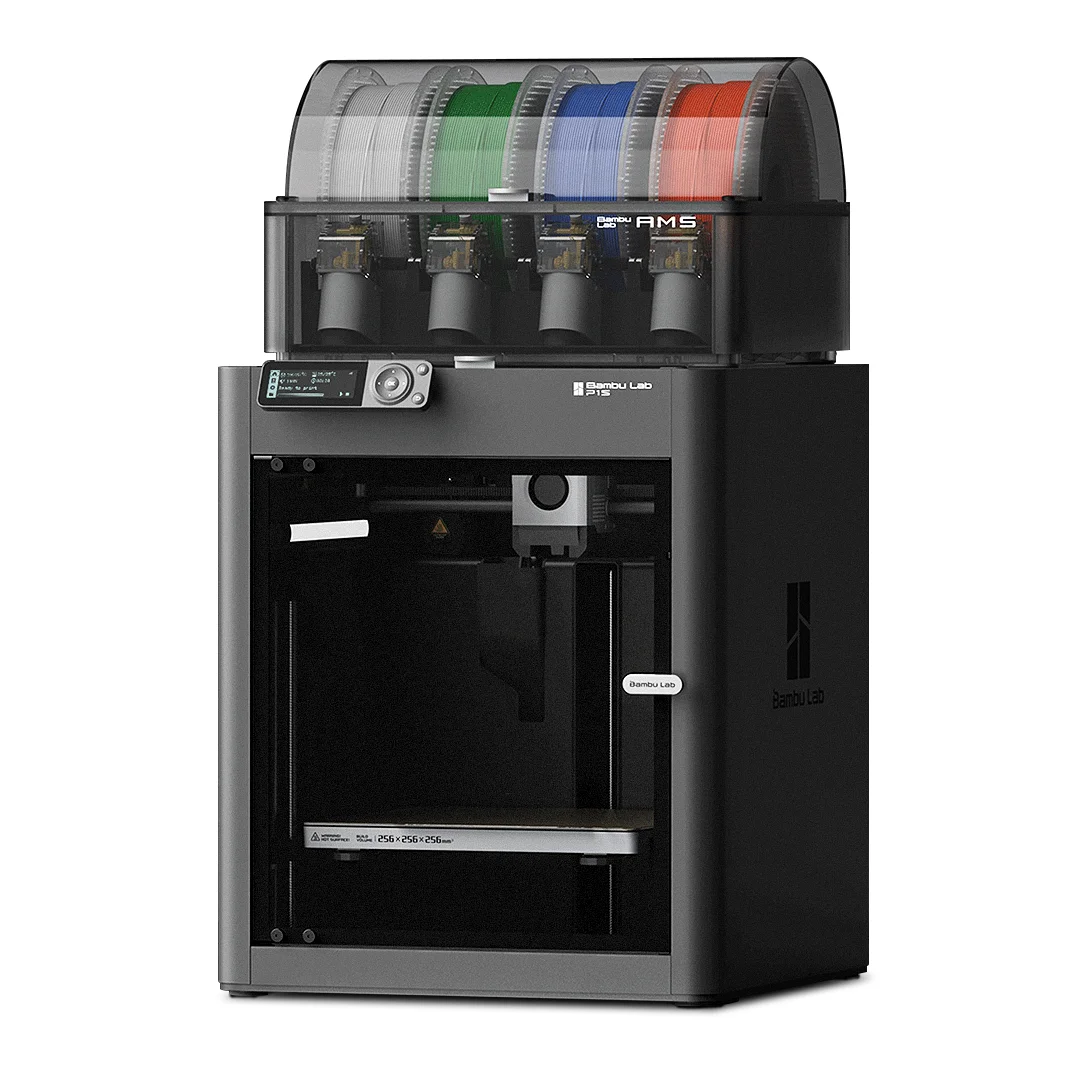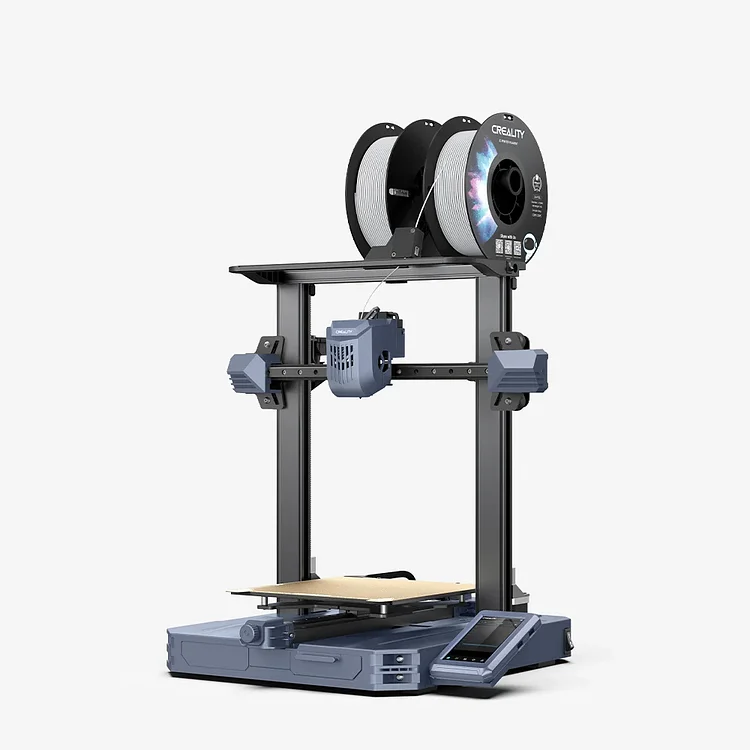Compare P1S vs CR10 SE
Comparison between the best 3D printers
Choose the best 3D printer at the best price. The cheapest 3D printers are here.
Buy a 3D printer here with 3D Fila.
 |
 |
|
| Model | P1S[BUY P1S] |
CR10 SE |
| Printing Material | Filament | Filament |
| Buy Filament for Bambu Lab P1S | Buy Filament forCreality CR10 SE | |
| Estimated price | $949,00 | $386,00 |
| Manufacturer | Bambu Lab | Creality |
| Release Year | 2023 | 2023 |
| Print Volume [mm] | 256x256x256 | 220x220x265 |
| Printer Size [mm] | 389x389x458 | 490x470x625 |
| Weight [kg] | 12,95 | 6,9 |
| Power Loss Recovery | YES | NO |
| Enclosed printer | YES | NO |
| Bed Leveling | Automatic | |
| Filament End Sensor | YES | NO |
| Bed type | Heated | |
| Power supply system | Direct Drive | Direct Drive |
| Standard nozzle | 0,4 | 0,4 |
| Maximum Nozzle Temperature [°C] | 300 | 300 |
| Maximum Bed Temperature [°C] | 100 | 110 |
| Maximum printing speed [mm/s] | 500 | 600 |
| Filament holder | YES | YES |
| Camera for supervision | YES | YES |
| Recommended filaments | PLA, PETG, TPU, PVA, PA, PA-CF, Nylon, PC | PLA, PETG, PET, TPU, PA Wood, ABS, ASA, PA, PLA-CF |
| Recommended slicers | Bambu Studio, Super Slicer, Cura, Prusa Slicer, Orca | Creality Print, Cura, Simplify3D, PrusaSlicer, Orca Slice |
| Maximum Resolution [mm] | 0,1 | 0,1 |
| Processor | Quad ARM A7 1.2 GHz | |
| Display | Touchscreen 5'' | |
| Power Supply | 350 W | |
| Connectivity | Wifi, Bambu bus, Cartão SD | USB, Wifi |
| Operating systems | Windows, Linux, Macbook | Windows, Linux, Macbook |
| Date of registration in the system | 2024-04-11 | 2024-07-02 |
| Release date | 2023 | 2023 |
| Extra features | The Bambu Lab P1S stands out for its out-of-the-box practicality, eliminating the need for manual adjustments with automatic calibrations such as bed leveling and vibration compensation. It features multicolor printing capability through the AMS system, allowing up to 16 colors when connecting four AMS units. With an advanced control algorithm, the P1S offers fast printing speeds without sacrificing quality. Equipped with modern features such as filament end sensor, semi-automatic belt tension, direct extruder, welded frame and all-metal hotend, along with a fully enclosed chamber, the P1S promotes a superior printing experience, supporting a wide range of materials. | The Creality CR10 SE stands out for its printing speed of up to 600 mm/s, easy and intuitive assembly, direct extruder with double gears, hotend with hardened steel nozzle and ceramic heater, automatic leveling with CR-Touch and pressure sensor, and use of Creality OS firmware based on Klipper, with automatic input shaping calibration. It also includes Wi-Fi connectivity, a filament out-of-stock sensor and a robust structure with linear rails on the X and Y axes. |
| Support for multiple colors and materials (AMS and CFS) | YES | NO |
Notes * |
||
| Cost-benefit | 7 / 10 | 7 / 10 |
| Hardware | 6.4 / 10 | 2.4 / 10 |
| Tela | . | . |
| Print volume | 4 / 10 | 3 / 10 |
| Performance | 4 / 10 | 5 / 10 |
| [BUY P1S] |
Conclusion |
| In comparing the Bambu Lab P1S and the Creality CR10 SE, both printers are released in 2023 and cater to different user needs and budgets. The P1S offers advanced features such as automatic bed leveling, filament end sensors, and a fully enclosed print chamber, making it ideal for users who value convenience and versatility. It supports multicolor printing and has a robust system for handling various filaments, thereby enhancing its overall functionality and print quality. On the other hand, the CR10 SE, while lacking some of the advanced features present in the P1S, excels in its printing speed and affordability. It provides a solid build and user-friendly assembly, making it suitable for those looking for a straightforward and effective 3D printing solution at a lower price point. The increased printing speed and capability with a variety of materials also make it a compelling choice for hobbyists and makers who prioritize speed. Ultimately, the choice between these two models hinges on the user's specific requirements: the P1S is a more sophisticated printer with extensive features for serious projects, while the CR10 SE offers a pragmatic approach for those seeking efficiency and greater savings. Both printers score similarly in cost-benefit, but the choice should reflect the balance between one's budget, desired capabilities, and the types of projects planned. |

